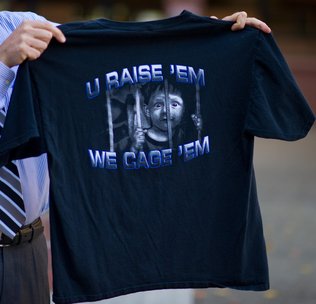Speaking While Black: False Confessions, Chicago Police, and Torture
In 1994, a year before I moved to Chicago, four black teenage boys were accused of a vicious rape and murder. These young men became known as the Englewood Four. This past week, a judge vacated their convictions citing the fact that their “confessions” to the crime had been coerced.
For seventeen years, the men had fought to clear their names. Now they await a decision by the State’s Attorney as to whether they will be re-tried for the crime. This decision to vacate the Englewood Four’s convictions comes on the heels of the release of three other black men who were wrongfully convicted as part of the Dixmoor Five. Once again, in the Dixmoor case, the men had been convicted of the rape and murder of a young woman when they were all juveniles. They allegedly confessed to the crime.
If you are noticing a pattern here, you should. Research suggests that young people are more susceptible to police coercion and therefore more likely to give false confessions when they feel pressured and scared. In their book “True Stories of False Confessions,” Rob Warden and Steven Drizin of the Center on Wrongful Convictions at Northwestern University Law School offer several reasons for false confessions:
1. Brainwashing: interrogators convince the suspect that he or she must have committed the crime during a memory blackout.
2. Child abuse: interrogators persuade a child to confess by exploiting his or her vulnerability and tendency to trust authority.
3. Desperation: a suspect confesses in order to end the exhausting interrogation, believing that he or she can straighten things out later.
4. Inquisition: interrogators convince the suspect that confessing is the only way to avoid a harsh punishment like the death penalty.
5. Mental fragility: interrogators persuade a mentally ill person to confess by exploiting his or her vulnerability and tendency to trust authority.
6. Inference: interrogators take a suspect’s statement as a confession when it was not meant to be.
7. Fabrication: interrogators simply make up a confession if they can’t obtain one.
8. Opportunism: an informant tries to provide information about the crime in exchange for a reward but ends up being persuaded to confess.
9. Pretense: cases when mentally ill people confess to a crime either because they truly believe they committed it or to gain fame.
10. Police force: interrogators use physical abuse to force a confession.
For more information about why innocent people “confess” to crimes that they haven’t committed, the Chicago Tribune published a good article on the subject.
The Center on Wrongful Convictions suggests that one way to prevent false confessions would be electronically record all police interrogations. This seems like a no-brainer to me. Yet there has been sustained and furious resistance to this in cases other than homicide. If the police have nothing to hide, they should welcome the scrutiny. If they have nothing to hide…
In Chicago, the city of the Burge Police Torture Cases, we are not under the illusion that we should trust law enforcement. In our case, we must VERIFY before we can trust. The 100 African-American men and women who were systematically tortured by police between 1972 and 1991 demand this of us.
P.S. I want to make a pitch for a great project that I am involved with. If you are an artist, educator, organizer, or concerned citizen, I invite you to submit a proposal to the Chicago Torture Justice Memorials project. The deadline for submissions is December 10th. You do not have to be a resident of Chicago to submit your ideas.
P.P.S. I think that it is appropriate to post this spoken word piece by Bassey Ikpi about Amadou Diallo.

